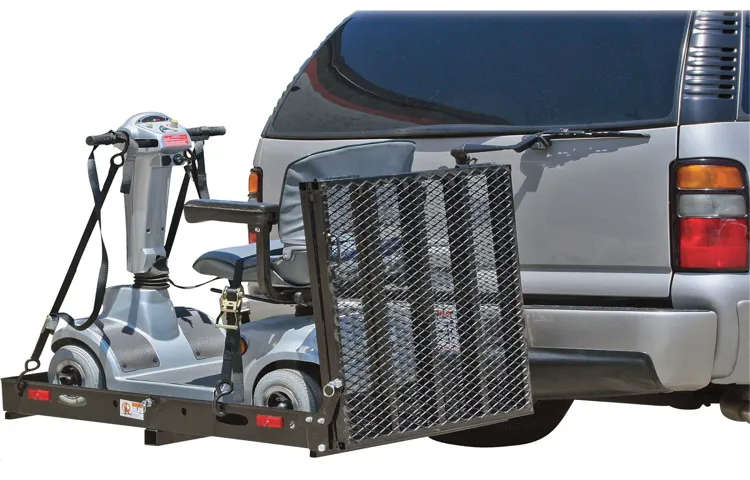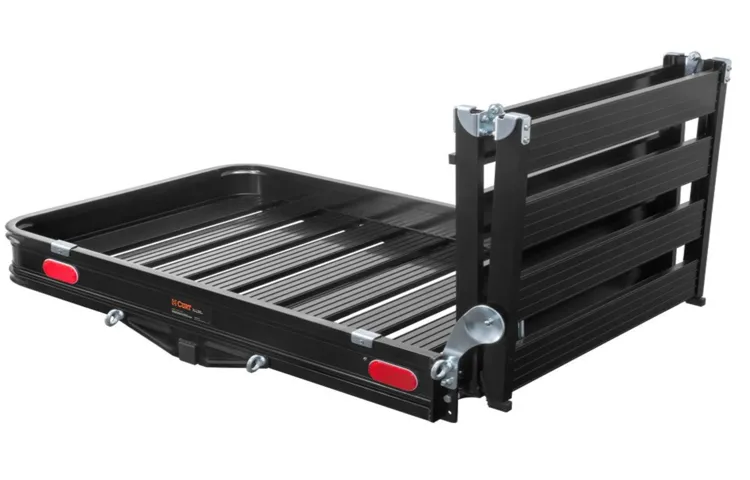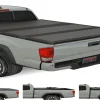Are you an avid adventurer or someone who loves spending time in the great outdoors? If so, you’ve probably encountered the challenge of transporting all your gear and equipment to your desired destination. Whether it’s camping gear, bicycles, or even a kayak, finding a way to transport everything can be quite a headache. This is where a hitch carrier comes in handy.
So, what exactly is a hitch carrier? Think of it as a sturdy and reliable attachment for your vehicle that allows you to conveniently transport bulky items that wouldn’t fit inside your car or SUV. It’s like having an extra storage space at the rear of your vehicle. Whether you’re heading out for a weekend getaway or embarking on a cross-country road trip, a hitch carrier can be a game-changer in terms of convenience and ease.
Imagine this scenario – you’re planning a camping trip with your friends, and you need to pack a tent, sleeping bags, cooking equipment, and other essentials. However, there isn’t enough space in the trunk of your car to fit everything. Instead of cramming everything inside, risking damage or discomfort, you can simply attach a hitch carrier to the back of your vehicle and load all the gear onto it.
This not only frees up space inside your car but also ensures that your gear remains secure and protected during the journey. Not only are hitch carriers practical for camping enthusiasts, but they’re also incredibly versatile. If you’re an avid biker, you can use a hitch carrier to transport your bicycle without the hassle of disassembling it or renting a separate bike rack.
Likewise, if you’re a water sports enthusiast, a hitch carrier can safely transport your kayak or paddleboard to the nearest lake or coast. Hitch carriers come in various shapes and sizes, depending on your specific needs. Some are designed solely for bicycles, while others can accommodate multiple items at once.
They are typically made from durable materials such as steel or aluminum to ensure their strength and longevity. In conclusion, a hitch carrier is an essential accessory for anyone who loves outdoor adventures or needs to transport bulky items. It provides a convenient and secure way to transport gear and equipment, making your journey more enjoyable and stress-free.
Table of Contents
Overview of Hitch Carriers
A hitch carrier, also known as a hitch-mounted cargo carrier or hitch rack, is a device that attaches to the rear of a vehicle and allows for additional storage space. It is typically installed on the vehicle’s hitch receiver, which is a square or rectangular opening located underneath the rear bumper. Hitch carriers come in various sizes, shapes, and weight capacities to accommodate different types of cargo, such as luggage, camping gear, bicycles, or even motorcycles.
They provide a convenient and secure way to transport bulky items that may not fit inside the vehicle. With a hitch carrier, you can free up space inside the car and ensure a comfortable and clutter-free ride for your passengers. Whether you’re going on a road trip or simply need extra storage space for everyday activities, a hitch carrier is a practical solution that can make your life easier.
Definition of a Hitch Carrier
A hitch carrier is a convenient and versatile accessory for your vehicle that allows you to transport large and bulky items safely and efficiently. It is essentially a platform that attaches to the back of your vehicle, specifically to the hitch receiver. Hitch carriers come in various shapes and sizes, but they all serve the same purpose: to provide a secure and stable base for carrying items that would otherwise be difficult or impossible to fit inside your vehicle.
Whether you need to transport bikes, luggage, camping gear, or even small motorcycles, a hitch carrier can make the process much easier. With its sturdy construction and easy installation, a hitch carrier is a practical solution for anyone in need of extra cargo space. So if you find yourself with limited room in your vehicle for your next adventure, consider investing in a hitch carrier to make your life a whole lot easier.

Types of Hitch Carriers
hitch carriers When it comes to transporting heavy and bulky items, hitch carriers can be a game-changer. These carriers are designed to attach to the hitch receiver on the back of your vehicle, providing a convenient and secure way to transport your belongings. There are several types of hitch carriers available, each with its own unique features and benefits.
One type of hitch carrier is the cargo carrier, which is perfect for carrying luggage, camping gear, or other items that may not fit inside your vehicle. These carriers usually have a flat, platform-like design with sides or rails to keep your items secure. Some cargo carriers also come with a cargo net or bag to provide additional protection from the elements.
Another type of hitch carrier is the bike rack. If you’re an avid cyclist, a bike rack hitch carrier can be a game-changer. These carriers typically have a tray or arms that can securely hold your bikes in place while you drive.
This not only frees up space inside your vehicle but also ensures that your bikes are safe and secure during transportation. For those who need to transport larger items, there are hitch carriers specifically designed for hauling motorcycles or ATVs. These carriers often have a ramp for easy loading and unloading, as well as tie-down points to keep your vehicle secure during transportation.
In conclusion, hitch carriers offer a convenient and secure way to transport a variety of items. Whether you need to haul luggage, bikes, or even motorcycles, there is a hitch carrier out there to meet your needs. So next time you’re planning a road trip or outdoor adventure, consider investing in a hitch carrier to make your journey that much easier.
Benefits of Using a Hitch Carrier
hitch carrier, benefits of using a hitch carrier Hitch carriers are a popular and practical solution for transporting bulky items, such as luggage, camping gear, or even bikes. These carriers are designed to attach to the hitch receiver on the back of vehicles, making it easier and more convenient to transport large or heavy objects. One of the main benefits of using a hitch carrier is that it frees up space inside the vehicle, allowing passengers to travel comfortably.
With a hitch carrier, there’s no need to cram everything into the trunk or backseat, creating a more pleasant and stress-free journey. Additionally, hitch carriers are versatile and can accommodate various types of cargo. Whether you need to transport sports equipment, gardening supplies, or even furniture, a hitch carrier can handle the job.
They come in different sizes and designs, allowin users to choose the one that best suits their needs. Another advantage of using a hitch carrier is the ease of installation. They are typically very easy to attach to the hitch receiver, requiring only a few simple steps.
Once secured, you can have peace of mind knowing that your cargo is safely fastened and won’t be bouncing around during the journey. Overall, hitch carriers are a practical and efficient solution for transporting large or heavy items. They offer extra storage space, versatility, and ease of use, making them a valuable accessory for any vehicle owner.
Choosing the Right Hitch Carrier
A hitch carrier, also known as a hitch-mounted cargo carrier, is an accessory that attaches to your vehicle’s hitch receiver and provides additional storage space for carrying bulky items. It is a convenient and efficient solution for those who need extra cargo capacity but don’t want to invest in a larger vehicle or a roof-mounted carrier. Hitch carriers come in various sizes and designs, including enclosed boxes, basket-style racks, and flat platforms.
They are designed to fit different hitch receiver sizes, so it is important to choose one that is compatible with your vehicle. Whether you need to transport camping gear, sports equipment, or luggage, a hitch carrier can be a practical and cost-effective solution. It allows you to free up valuable interior space and keep your items secure during transit.
So, if you’re in need of extra storage for your next adventure, considering a hitch carrier might be the right choice for you.
Considerations Before Buying a Hitch Carrier
When it comes to choosing the right hitch carrier, there are a few key considerations to keep in mind. First, you’ll want to consider the weight capacity of the carrier. Make sure it can handle the weight of the items you’ll be transporting.
Additionally, think about the size and dimensions of the carrier. Will it fit the items you need to transport? Will it fit your vehicle’s hitch size? Another important factor to consider is the construction and durability of the carrier. You’ll want something that is built to last and can withstand the rigors of the road.
Lastly, think about any additional features you might need, such as ramps or locks, to make loading and securing your items easier. By taking these factors into account, you’ll be well on your way to choosing the right hitch carrier for your needs.
Factors to Look for in a Hitch Carrier
hitch carrier, choosing the right hitch carrier, factors to look for in a hitch carrier When it comes to choosing the right hitch carrier, there are a few factors that you should consider. First and foremost is the weight capacity of the carrier. You want to make sure that it can safely hold the items you plan to transport without compromising the stability of your vehicle.
Additionally, consider the size of the carrier. Will it be able to accommodate the items you need to transport? You should also think about the type of hitch you have on your vehicle. Different hitches require different types of carriers, so be sure to choose one that is compatible with your specific hitch.
Another important factor is the ease of installation. Look for a hitch carrier that is easy to assemble and attach to your vehicle. Nobody wants to spend hours struggling to put together a complicated carrier.
Finally, consider the durability of the carrier. You want something that will stand up to the elements and last for a long time. By taking these factors into consideration, you can find the perfect hitch carrier for your needs.
Tips for Installing a Hitch Carrier
When it comes to installing a hitch carrier, choosing the right one for your vehicle is crucial. There are different types of hitch carriers available, such as cargo carriers, bike racks, and motorcycle carriers, so you need to consider your specific needs before making a decision. Think about how frequently you will be using the carrier and what you will be using it for.
For example, if you often go on camping trips and need to transport camping gear, a cargo carrier would be a great choice. On the other hand, if you are an avid cyclist and want to bring your bikes with you on road trips, a bike rack would be more appropriate. It’s also important to consider the weight capacity of the hitch carrier and ensure that it can safely support the weight of your belongings.
Additionally, make sure to choose a hitch carrier that is compatible with your vehicle’s hitch receiver and that it is easy to install and remove. Overall, taking the time to choose the right hitch carrier will ensure a smooth and hassle-free journey.
Using a Hitch Carrier
Are you struggling to find a way to transport your bulky items? Well, you’re in luck! A hitch carrier might just be the solution you’ve been looking for. But what exactly is a hitch carrier? Simply put, a hitch carrier is a device that enables you to transport large or heavy items on the back of your vehicle. It attaches to the hitch receiver on your vehicle, providing a secure and convenient way to transport your belongings.
Think of it as an extra storage space that you can take with you wherever you go. Whether you need to transport bikes, camping gear, or even furniture, a hitch carrier can make your life a whole lot easier. So why not invest in a hitch carrier and say goodbye to the stress and hassle of fitting everything into your vehicle? With a hitch carrier, you’ll have all the space you need to transport your belongings safely and efficiently.
Loading and Securing Items on a Hitch Carrier
hitch carrier, securing items, loading items, hitch rack, vehicle hauling Are you looking for a convenient and efficient way to transport your belongings or equipment? A hitch carrier might just be the answer you’ve been searching for! Using a hitch carrier is a popular method for hauling items behind your vehicle, whether you’re going on a camping trip, moving to a new home, or simply need to transport large or heavy items. These carriers, also known as hitch racks, are attached to the trailer hitch on the back of your vehicle, providing a sturdy and secure platform for loading items. When it comes to loading items onto a hitch carrier, there are a few key factors to consider.
First and foremost, it’s important to distribute the weight evenly to maintain balance and stability. This means placing heavier items towards the center of the carrier and lighter items towards the edges. Additionally, be sure to secure each item properly to prevent any movement or shifting during transport.
Bungee cords, straps, or cargo nets can all be used to keep your items in place. Safety is paramount when using a hitch carrier, so it’s crucial to double-check that all items are securely fastened before hitting the road. Give each strap a firm tug to ensure it’s tight and secure, and make sure there are no loose ends or dangling straps that could get caught in the vehicle’s wheels or exhaust system.
Taking the time to properly secure your items will not only protect your belongings but also prevent any accidents or damage to your vehicle. In addition to securing items on a hitch carrier, it’s important to consider the overall weight capacity of your carrier and vehicle. Overloading your carrier can put unnecessary strain on your vehicle’s suspension, brakes, and tires, which can be dangerous and potentially lead to costly repairs.
Check the manufacturer’s guidelines for your specific hitch carrier to determine the maximum weight it can safely handle. It’s also a good idea to consult your vehicle’s owner’s manual to ensure you’re not exceeding its towing capacity. Now that you have a better understanding of using a hitch carrier, you can confidently load and secure your items for your next adventure or project.
Whether you’re hauling camping gear, furniture, or any other large or heavy items, a hitch carrier can make the process much easier and more efficient. Just remember to distribute the weight evenly, secure each item properly, and stay within the weight limits of both your carrier and vehicle. With these tips in mind, you’ll be ready to hit the road and transport your items with ease and peace of mind.
Properly Distributing Weight on a Hitch Carrier
hitch carrier
Maintenance and Care of Hitch Carriers
A hitch carrier, also known as a hitch-mounted cargo carrier or hitch cargo carrier, is a device that attaches to the hitch receiver of a vehicle, allowing for the transportation of additional items or gear. It is an excellent option for those who require extra storage space when traveling, whether it be for camping trips, vacations, or other outdoor activities. A hitch carrier is typically made of durable materials such as steel or aluminum and can support various weights depending on its design.
It is important to properly maintain and care for your hitch carrier to ensure its longevity and optimal performance. Regularly inspecting the carrier for any signs of wear or damage, cleaning it thoroughly after each use, and storing it properly when not in use are essential steps in maintaining your hitch carrier. Additionally, you should regularly lubricate the hitch receiver and tighten any bolts or fasteners to prevent loosening.
By following these maintenance and care tips, you can extend the lifespan of your hitch carrier and enjoy its benefits for years to come. So, whether you’re heading out on a road trip or simply need some extra cargo space, a hitch carrier is a convenient and practical solution.
Conclusion
So, after this thorough exploration of what a hitch carrier is, we can confidently say that it is the superhero of cargo transportation solutions. With its sleek design, sturdy construction, and ability to attach to your vehicle’s hitch, it can effortlessly carry all your extra gear while leaving plenty of space for your passengers to ride comfortably. Think of it as your trusty sidekick, always ready to save the day by safely transporting everything from bikes and luggage to camping equipment and sports gear.
It eliminates the need for bulky rooftop carriers or cramming everything into your already cramped trunk. But what truly sets the hitch carrier apart is its versatility. It can easily be removed when not in use, making parking and maneuvering a breeze – a feat that even superheroes would envy.
And with different styles and sizes available, there’s a hitch carrier for every adventurer and every type of vehicle. So whether you’re a weekend warrior, an outdoor enthusiast, or just someone who needs some extra storage space, the hitch carrier is here to make your life easier. Say goodbye to strained backs from lifting heavy loads and hello to a world of convenience and efficiency.
In conclusion, a hitch carrier is a game-changer when it comes to transporting extra cargo. It’s like having a personal assistant that can handle all your gear without breaking a sweat. So go ahead, join the hitch carrier revolution, and make your travels smoother than ever before.
Your adventures await!”
FAQs
What is a hitch carrier?
A hitch carrier is a device that attaches to the back of a vehicle’s hitch receiver and provides a platform for transporting items such as bicycles, cargo boxes, or even motorcycles.
How do hitch carriers work?
Hitch carriers typically consist of a metal frame that attaches to the vehicle’s hitch receiver and a platform on which the items can be securely fastened. They are installed by sliding the carrier into the hitch receiver and using a hitch pin and lock to secure it in place.
Are hitch carriers safe for transporting heavy items?
Yes, hitch carriers are designed to safely transport heavy items. However, it is important to ensure that the carrier is properly installed and that the weight capacity of the hitch and carrier are not exceeded. Additionally, securing the items properly and distributing the weight evenly is crucial for safe transportation.
Can hitch carriers be used on any type of vehicle?
Hitch carriers can be used on most vehicles that have a compatible hitch receiver. However, it is important to consider the vehicle’s weight capacity and the weight of the items being transported to ensure safe usage.
Are hitch carriers compatible with different hitch sizes?
Hitch carriers usually come in different sizes to accommodate various hitch receiver sizes. It is important to select a hitch carrier that matches the size of your vehicle’s hitch receiver.
Can hitch carriers be used with a trailer?
In most cases, hitch carriers cannot be used simultaneously with towing a trailer. The weight of the trailer and the items on the carrier could exceed the vehicle’s weight capacity and compromise safety. It is advised to consult the vehicle’s owner manual for specific guidelines.
Are hitch carriers easy to install and remove?
Hitch carriers are generally designed to be easy to install and remove. They typically require basic tools and can be done by one person. However, the specific installation and removal process may vary depending on the type and brand of the hitch carrier.
Do hitch carriers affect vehicle fuel efficiency? A8. The addition of a hitch carrier to a vehicle may slightly affect fuel efficiency. The increased wind resistance can cause a slight decrease in MPG (miles per gallon). However, the impact on fuel efficiency is typically minimal and may vary depending on factors such as driving conditions and the type of items being transported.
Can hitch carriers be used on vehicles with spare tire mounts?
Some hitch carriers are designed to be compatible with vehicles that have spare tire mounts. These carriers provide clearance for the spare tire and can still be used effectively for transporting items.
Can hitch carriers be used with vehicles equipped with backup cameras?
Hitch carriers may partially obstruct the view of a backup camera depending on the specific design and placement of the camera. It is important to consider the compatibility of the carrier and the vehicle’s backup camera system to ensure safe usage.
Are hitch carriers legal to use on public roads?
Hitch carriers that are properly installed and do not exceed weight or size limits are generally legal to use on public roads. However, it is recommended to check local regulations and laws to ensure compliance with specific requirements.
Can hitch carriers be used for long-distance travel?
Hitch carriers can be used for long-distance travel, but it is important to consider factors such as weight distribution, vehicle weight capacity, and the type of items being transported. It is advisable to periodically check the carrier and items during the journey to ensure everything remains securely fastened.



